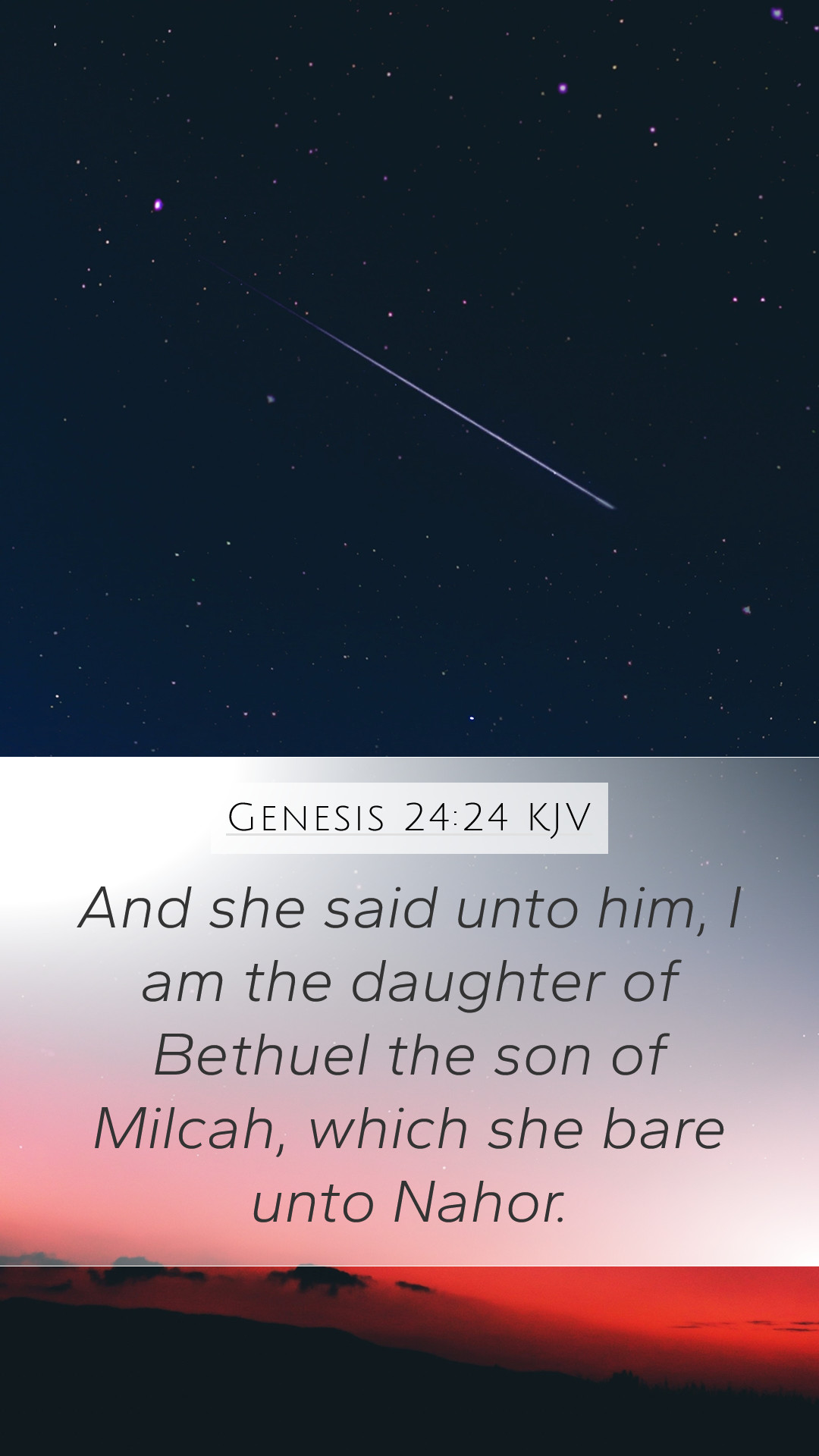Understanding Genesis 24:24
Genesis 24:24 states, "And she said unto him, I am the daughter of Bethuel the son of Milcah, which she bare unto Nahor." This verse is a part of the profound narrative concerning the servant of Abraham who is dispatched to find a wife for Isaac. Through this text, we can derive several insights that enhance our understanding of its significance and context.
Bible Verse Meanings
This verse not only provides a genealogical link but also serves as a critical moment in the unfolding plan of God regarding the lineage of Abraham. The servant's encounter with Rebekah is characterized by divine providence, showcasing God's guidance in the selection of Isaac's wife.
Bible Verse Interpretations
In interpreting this passage, it is essential to acknowledge the importance of family lineage in Biblical times. The mention of Bethuel and Nahor indicates Rebekah's heritage, which is significant as God’s covenant blessings were deeply tied to Abraham’s family. This underscores the necessity for Abraham's lineage to marry within their own familial line, as instructed by God.
Bible Verse Understanding
Understanding this verse in the context of the entire chapter reveals a narrative filled with prayer, divine orchestration, and the fulfillment of God's promises. The servant’s successful mission is not simply about finding a wife; it is about fulfilling God's covenant with Abraham to secure a people who would bear His blessings.
Bible Verse Explanations
This explanation highlights the significance of Rebekah's response. Her identification as the daughter of Bethuel instantly signals her position within Abraham’s broader family, suggesting a divinely ordained outcome that aligns with Abraham's earlier instructions to his servant to find a suitable wife from his own kin rather than from the Canaanites.
Bible Verse Commentary
Matthew Henry notes that Rebekah’s unambiguous lineage is a sign of God's providence. This moment emphasizes the divine hand in decisions of marriage which, in turn, shapes the future of a nation. Albert Barnes also points out that the emphasis on her ancestry reflects God’s faithfulness to His promises, as outlined in prior scriptures. Adam Clarke highlights the broader implications of lineage concerning the fulfillment of prophetic promises made to Abraham.
Scripture Analysis
The genealogical reference within this verse also invites readers to see the connectivity of stories in Scripture. It links back to God's covenant with Abraham and extends forward to how this lineage will play a critical role in the narrative of God's chosen people. Biblical exegesis of this verse suggests that understanding family dynamics within biblical contexts is essential for a complete interpretation.
Bible Study Insights
- Divine Intervention: The selection of Rebekah is an example of how God intervenes in human affairs to fulfill His plans.
- Importance of Heritage: This passage reveals the Jewish value placed on lineage and the importance of marrying within one’s own people to preserve God's covenant.
- Guidance and Prayer: The servant’s reliance on prayer throughout this narrative encourages Bible study groups to seek God's guidance in their own decisions.
Cross References
- Genesis 11:29 - The lineage of Terah and his descendants.
- Genesis 24:3 - Abraham’s instruction to his servant.
- Genesis 25:20 - Isaac's lineage and marriage to Rebekah.
Conclusion
Genesis 24:24 is not merely a statement of identity; it encapsulates the essence of God’s faithfulness, the importance of divine guidance, and the continuation of Abraham's lineage through careful selection. Understanding such intricacies helps deepen our Bible study insights, providing clarity on how to apply these truths to daily life.


